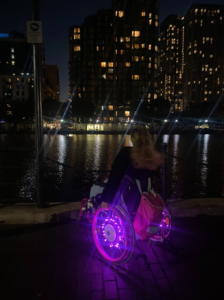Finding your community, building your network, and boosting yourself up. These are all things that our latest Spotlight Story Program feature writer has not only incorporated into her daily life, but has projected into her activism as she empowers other young people in the disability community. And that focus on connecting with others and becoming your own best advocate stems deeply into all that Brighton, England’s very own Lauren Perry represents in her life. Living with Tourette’s Syndrome and Ehlers Danlos Syndrome, 21-year-old Lauren has needed to create power, joy and success for herself while also dealing with the journey that chronic illness can complicate. She’s been super proactive, using social media to create her own platforms that allow for meetups with others living with chronic illness in the Brighton area, and her virtual platform with her blog and Instagram page @aticcersguidetolife, that allows her to raise awareness, connect with others, learn how to advocate even better and share about her health journey. And she also shows off her cool wheelchair with pink wheels, a must-see! Lauren’s packed so much life advice in her feature about her young adult life with health struggles and being part of InvisiYouth’s Global Brand Leaders Program that anyone can gain tips.
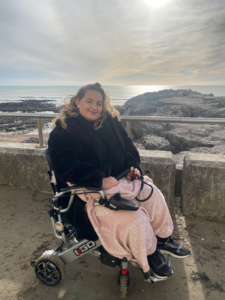 Hey! I’m Lauren, I’m a 21 year old disabled student living in Brighton, England. I set up my disability blog and Instagram page @aticcersguidetolife with a hope to raise awareness on life with hidden disabilities, advocate for those who are unable to do so themselves and educate people on the wider issues disabled and chronically ill people face.
Hey! I’m Lauren, I’m a 21 year old disabled student living in Brighton, England. I set up my disability blog and Instagram page @aticcersguidetolife with a hope to raise awareness on life with hidden disabilities, advocate for those who are unable to do so themselves and educate people on the wider issues disabled and chronically ill people face.
Updating friends and family on my health was becoming pretty exhausting in the early stages of my illness, but I wanted to make sure they all felt included in the process as I knew they genuinely wanted to know, so starting my blog was a great way to document my journey.
My health struggles started after a coccyx injury following a fall at work when I was waitressing, coinciding with laryngitis that wouldn’t go away and at the age of 17, I became incredibly unwell.
I was sleeping for days at a time and my body was not healing properly. I struggled to get through my A Level exams and got mediocre grades. I went from a high achiever who played in bands (saxophones, clarinet, piano), ran, went to the gym 4 times a week, swam, played hockey, and partied—to the girl who had to stopped working, slept all day, and was in incredible amounts of pain in a matter of weeks. And I’ve never been the same since.
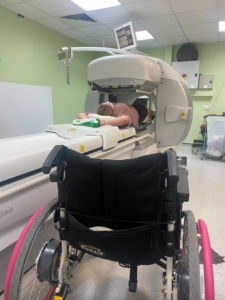 The doctors blamed my mental health initially. I struggled with panic disorder and depressive disorder, however I knew this was different. The debilitating fatigue was different. At its worst, I was sleeping 28 hours at a time. I woke up for one hour to have a drink and slept for a further 15 hours. This sleeping pattern continued till the moment I had carers at 20. I’ve had countless misdiagnosis’, painful scans, frustrating results and random symptoms- chronic illness is a journey .
The doctors blamed my mental health initially. I struggled with panic disorder and depressive disorder, however I knew this was different. The debilitating fatigue was different. At its worst, I was sleeping 28 hours at a time. I woke up for one hour to have a drink and slept for a further 15 hours. This sleeping pattern continued till the moment I had carers at 20. I’ve had countless misdiagnosis’, painful scans, frustrating results and random symptoms- chronic illness is a journey .
Having a disability in my late teens, I noticed quickly how isolating that can be, particularly as a university student. It seemed that although there must be thousands of disabled students, I didn’t know any and I felt there must’ve been other people that felt similar to me.
I decided to set up ‘A little poorly- Brighton’ in 2019 after a year of being at university. We now have over 400 members in Brighton, England where I have founded an online community and we formed friendships and a support network for chronically ill people living in Brighton and Hove, along with their carers. Now, I regularly arrange meet ups where I have professionals run workshops such as cooking with a disability, accessing work with a disability, improving hospital experiences for chronically ill patients, self-defense classes, art therapy, just to name a few.
In addition to ‘a little poorly – Brighton,’ I also take great pride in my Instagram page and newly updated website. Accessibility is a topic incredibly close to my heart. Through my platforms, I strive to help people access the inaccessible world. InvisiYouth has inspired me to build confidence to make friendships online with people all over the world. The Pandemic has taught me that accommodations can be made for disabilities. Online learning has been incredibly accessible to me as a disabled student, I spent many months battling for more support
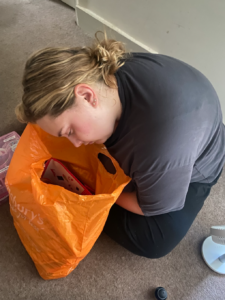 I started my health journey not truly identifying as a disabled woman and rather just a 17 year old girl. I saw myself with misdiagnoses and I didn’t feel confident or educated in disability. Doctors often say “I think you have this” and then leave you with so many unanswered questions surrounding this new potential diagnosis.
I started my health journey not truly identifying as a disabled woman and rather just a 17 year old girl. I saw myself with misdiagnoses and I didn’t feel confident or educated in disability. Doctors often say “I think you have this” and then leave you with so many unanswered questions surrounding this new potential diagnosis.
I’ve learned to laugh in the most unfunny moments, make the most out of bad situations and I have shown my mental strength and resilience is important above all. I think I’ve become incredibly calm. In situations where perhaps someone else may panic or be overwhelmed—for myself—relatively these things often feel ‘small’ and I’m therefore pretty good at staying calm.
I’ve sadly had to grow up a lot quicker than my peers, but I also think that I’ve become much more understanding of other people’s emotions and gained a level of emotional maturity as my priorities have had to shift being unwell.
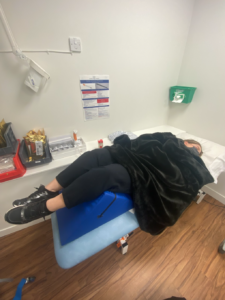 My diagnosis list is ever growing. Tourette’s Syndrome hit me out of the blue at 19 in my first year of university. I lost my speech out the blue for two weeks when I was 20 following a hemiplegic migraine which replicated a stroke.
My diagnosis list is ever growing. Tourette’s Syndrome hit me out of the blue at 19 in my first year of university. I lost my speech out the blue for two weeks when I was 20 following a hemiplegic migraine which replicated a stroke.
Nothing surprises me anymore.
Honestly, if you don’t laugh, you’ll cry and that’s the best way we’ve found to approach my illnesses. It went from “why me- it’s always me” to “only me, typical” making a positive out of a negative or light and laughter out of an awful situation is very important. As chronically ill people, we often joke that we are unqualified doctors.
I truly believe the sheer knowledge that having a chronic illness has taught me is fascinating and perhaps something I would not have delved into had I not become unwell. I like to consider myself a receptionist or admin assistant to my own body—I appreciate my disabilities for supporting my love of stationery and organization—I bet you’ve never seen paperwork as organised and colourful as mine!
As kids we always get told not to talk to strangers and to some extent, I agree. However, had I not found such an amazing online community through Instagram I wouldn’t have found InvisiYouth, its Global Brand Leaders Program, or other content creators with disabilities. I’ve spent hours messaging other people on the internet .
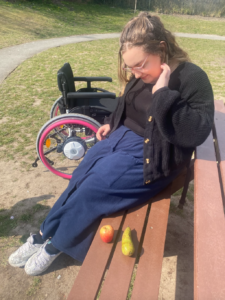 Speaking to people online is such a powerful tool in management of disability. I’ve found many of my consultants through Facebook groups. My Rheumatologist who diagnosed my EDS was recommended through a Facebook group. My sleep consultant was recommended by a few people on Instagram. My cardiologist similarly.
Speaking to people online is such a powerful tool in management of disability. I’ve found many of my consultants through Facebook groups. My Rheumatologist who diagnosed my EDS was recommended through a Facebook group. My sleep consultant was recommended by a few people on Instagram. My cardiologist similarly.
It makes me feel like there’s loads of people like me. People who just ‘get it’ but can also support me in my journey and answer any questions from the perspective of poorly people not just as medical professionals.
The feeling of bumping into people who follow me on Instagram brings me so much happiness. The few times I’ve been approached in the streets after my pink wheels have been spotted from a distance on days where I’ve been struggling or having issues with accessibility- it makes all the appointments and the hours of pain worth it.
In that moment you feel less alone and feel like what you’re doing is really important. It’s comforting to know when you have a weird symptom that your doctor has never seen before, that there’s someone on the other side of the world who has it too and has a little bit of wisdom that might help.
- I suggest having a list of all our conditions, medication, allergies and care needs summarised to take to appointments is incredibly useful, it really helps save time in appointments too. I used to get really frustrated when I felt like most of my appointment was spent covering medical history and less on my current issue.
- Don’t be afraid to tell doctors or medical professionals what you need! You are an expert of your own body!
- Find your people- there are people out there for you, who will understand you, support you, and think like you. Put yourself out there! People will put effort in and people will make time if they want. No one is ever too busy for the people they want to see!
- If you don’t laugh, you’ll cry.
- You’re braver than you believe, stronger than you seem, smarter than you think, more loved than you’d ever know and twice as beautiful than you ever imagined
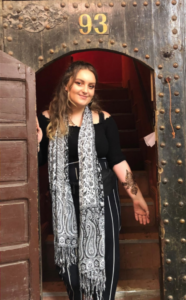 My main message to share: You can do anything you want to do. The world might not be built for disabled people, but if you find the right people and understand your own needs, you’ll be able to access the inaccessible!
My main message to share: You can do anything you want to do. The world might not be built for disabled people, but if you find the right people and understand your own needs, you’ll be able to access the inaccessible!
Don’t worry about other people’s judgement for any step of your journey. You should be able to live life to the fullest and enjoy it like anyone else your age.
Not all wheelchair users can’t walk just like not all disabilities are visible. Society strangely seems to have taught us the opposite.
Accepting I needed to use a wheelchair in order to have fun/ live life as my peers do has honestly been the best decision I have ever made.
